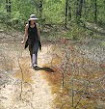"A bioregion is a geographical area that is defined by its natural features as opposed to human constructed political boundaries.
...The bioregional perspective allows us to take a comprehensive look at watershed, soil, native vegetation and restoration, etc. and how these natural characteristics affected culture and community. These elements are highly interrelated and bioregionalism provides a framework for studying their interconnections. Too often we have separate organizations looking at the ecology, science, and not combining it with the humanities, community, culture, etc.
.. Bioregionalism advocates community sustainable living, believing that is an inevitable shift to ensure the future of humanity. As David Aberly writes, “Bioregionalism offers the best hope we have for creating an interdependent web of self-reliant, sustainable cultures.” To be a part of a bioregion is to inhabit a living community that is located in place. Bioregionalism might also be described as in Wes Jackson's words, "Becoming native to Place."
...The heart of bioregionalism is to cultivate a sense of place. The idea is founded in locating ourselves within a bioregion, defined by the natural features of the land. Humans are affected by the places we live in. As inhabitants we must learn how to live sustainably which begins with an understanding of place. This is the work of re-inhabitation. To be part of a bioregion is to inhabit a living community that is located in place. The work of re-inhabitation involves communities rooted in place and extending our conception of community to include all living things in our bioregion. In this sense, bioregional thinking is clearly closely related to ecological sustainability." -- excerpt: An Introduction To Bioregionalism
7 May 2007
Why Bio-regionalism
Subscribe to:
Post Comments (Atom)


No comments:
Post a Comment